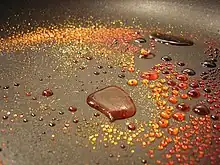caramel
English

Alternative forms
caromel (archaic)
Etymology
Unadapted borrowing from French caramel, from Spanish caramelo, from Portuguese caramelo, dissimilated from Late Latin calamellus, diminutive of calamus (“reed”) (and a doublet of chalumeau and shawm). Alternatively from Medieval Latin cannamellis, which is a compound of canna + mellis.
Pronunciation
- (Received Pronunciation, General Australian, New Zealand, General American, Mary–marry–merry distinction) IPA(key): /ˈkæɹ.ə.mɛl/, /ˈkæɹ.ə.məl/[1][2][3]
- (General American, Mary–marry–merry merger) IPA(key): /ˈkɛɹ.ə.mɛl/, /ˈkɛɹ.ə.məl/[3]
- (General American) IPA(key): /ˈkɑɹ.məl/,[2][3][4] /ˈkɑɹ.ə.məl/, /ˈkɑɹ.ə.mɛl/
Audio (US) (file)
Usage notes
Both the two-syllable and the three-syllable pronunciations are very common in all regions of the United States. The three-syllable pronunciation is more common than the two-syllable one in the South (excluding western Texas), northern New Jersey, eastern New York, and New England, while the two-syllable one is more common in other regions.[5]
Noun
caramel (countable and uncountable, plural caramels)
- (uncountable) A smooth, chewy, sticky confection made by heating sugar and other ingredients until the sugars polymerize and become sticky.
- 2004, Harold McGee, chapter 12, in On Food and Cooking: The Science and Lore of the Kitchen, Scribner, →ISBN:
- The usual technique for making caramel is to mix table sugar with some water, then heat until the water has boiled off and the molten sugar colors.
- (countable) A (sometimes hardened) piece of this confection.
- 2004, Harold McGee, chapter 12, in On Food and Cooking: The Science and Lore of the Kitchen, Scribner, →ISBN:
- Caramel has a rich, complex flavor and consistency, viscous and sticky and creamy all at once, that works well with most sweets and fruits, with coffee and chocolate, and even with salt: the prized caramels of Brittany are made with a notable dose of sea salt.
- A yellow-brown color, like that of caramel.
- caramel:
Derived terms
Translations
|
Adjective
caramel (not comparable)
- Of a yellow-brown color.
- 2001, Nicole Sconiers, California Schemin': The Black Woman's Guide to Surviving in LA:
- Every time I saw this caramel cutie, she was working on a new proposal or business plan or flyer to promote herself and her event coordinating business.
Verb
caramel (third-person singular simple present caramels, present participle caramelling or carameling, simple past and past participle caramelled or carameled)
- (transitive, cooking, dated) To caramelize.
- 1900, M. M. Mallock, The Economics of Modern Cookery: Or, A Younger Son's Cookery Book:
- To turn out, place the dish over the mould, and invert both together, when, if the caramelling has been complete, the pudding should slip out without any difficulty at all.
References
- “caramel”, in Lexico, Dictionary.com; Oxford University Press, 2019–2022.: /ˈkarəmɛl/, /ˈkarəm(ə)l/
- “caramel”, in Dictionary.com Unabridged, Dictionary.com, LLC, 1995–present.
- “caramel”, in Merriam-Webster Online Dictionary, Springfield, Mass.: Merriam-Webster, 1996–present.
- “caramel” (US) / “caramel” (UK) in Macmillan English Dictionary.: /ˈkerəˌmel/, /ˈkɑrməl/
- Dialect Survey map 1, showing that both pronunciations are common in all regions, and map 2, showing which regions the di- and tri-syllabic pronunciations predominate in
Catalan
Etymology
Borrowed from Spanish caramelo, from Portuguese caramelo, from Latin calamellus. Doublet of caramell.
Noun
caramel m (plural caramels)
Derived terms
Further reading
- “caramel” in Diccionari de la llengua catalana, segona edició, Institut d’Estudis Catalans.
French
Etymology
Borrowed from Spanish caramelo, from Portuguese caramelo, probably from Late Latin calamellus, and therefore doublet of the inherited chalumeau.
Pronunciation
- IPA(key): /ka.ʁa.mɛl/
Audio (file)
Derived terms
Descendants
Further reading
- “caramel”, in Trésor de la langue française informatisé [Digitized Treasury of the French Language], 2012.